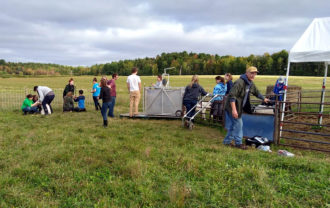For many small ruminant operations, grazing is central to farm profitability. However, grazing livestock increases risks of losses due to parasite-infested pastures. Haemonchus contortus, Barber pole worm, is a particular threat to sheep and goat farms throughout the Northeast region.
Although H. contortus (as a subtropical parasite) has adapted to northern climates, Jim Weber of the University of Maine conducted a Northeast SARE Research and Education Grant project to determine if northern New England farmers could use winter ecology to better manage this pest.
The team conducted a cold-tolerance study of H. contortus and found that parasites originating from sheep living in northern climates were more tolerant of cold conditions than parasites from sheep on farms in the Deep South, indicating that these parasites are indeed adapting to local conditions.
To help producers better manage these parasites, Jim and his team tested a number of control measures including adjusting dewormer timing, simulating reduced photoperiods, increasing parasite monitoring, and evaluating livestock stocking rates and grazing management.
A major emphasis of the project was teaching farmers methods to measure and effectively manage parasite populations on their farms. More than 400 farmers from Maine, New Hampshire and Vermont participated in the project's seminars, workshops and field days where they learned research results and received hands-on microscope training to identify and count parasite species in manure samples from their livestock. They also learned how to use FAMACHA, a technique to easily identify animals that may have H. contortus infestations.
122 farmers implemented non-chemical methods --improving rotational grazing systems, using Spring-time determinations of dewormer efficacy, and basing use of dewormers on individual fecal egg counts--to control H. contortus infestations in their flocks during
the grazing season. As a result, the project team estimated that over 4,000 lambs on farms in northern New England had reduced exposure to H. contortus parasitism, reducing rates of lamb death, and likely increasing weight gain for lambs destined for the meat market.
